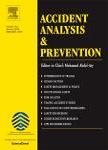版权所有:内蒙古大学图书馆 技术提供:维普资讯• 智图
内蒙古自治区呼和浩特市赛罕区大学西街235号 邮编: 010021

作者机构:Natl Chiao Tung Univ Dept Transportat Technol & Management Hsinchu 30010 Taiwan
出 版 物:《ACCIDENT ANALYSIS AND PREVENTION》 (事故分析与预防)
年 卷 期:2006年第38卷第2期
页 面:269-276页
核心收录:
学科分类:0303[法学-社会学] 1004[医学-公共卫生与预防医学(可授医学、理学学位)] 1201[管理学-管理科学与工程(可授管理学、工学学位)] 08[工学] 0837[工学-安全科学与工程] 0823[工学-交通运输工程]
主 题:license revocation driving exposure logistic regression model GEE
摘 要:This study investigated the effectiveness of administrative lifetime driver s license revocation (ALLR) and its impact on offenders, based on a two-stage survey of 768 offenders. It was found that after ALLR had been imposed, 23.4% of these offenders were still driving almost the same as before, 59.8% drove significantly less frequently, and only 16.8% of the offenders gave up driving completely. The results of logistic regression models showed that offenders compliance with ALLR was significantly correlated with their personal characteristics (age, income), penalty status (incarceration, duration of ALLR), and the need to drive for working, commuting and shopping. Elderly and low-income offenders were more likely to abide by the ALLR restriction. The application of the generalized estimating equations (GEE) model was used to identify the determinant factors affecting offenders driving mileage, and to effectively estimate the driving mileage reduction as a result of the ALLR. It was found that ALLR is fairly effective in keeping offenders off the road, but that it may reduce their ability to make a living. resulting in the less fortunate becoming more helpless. (c) 2005 Elsevier Ltd. All rights reserved.